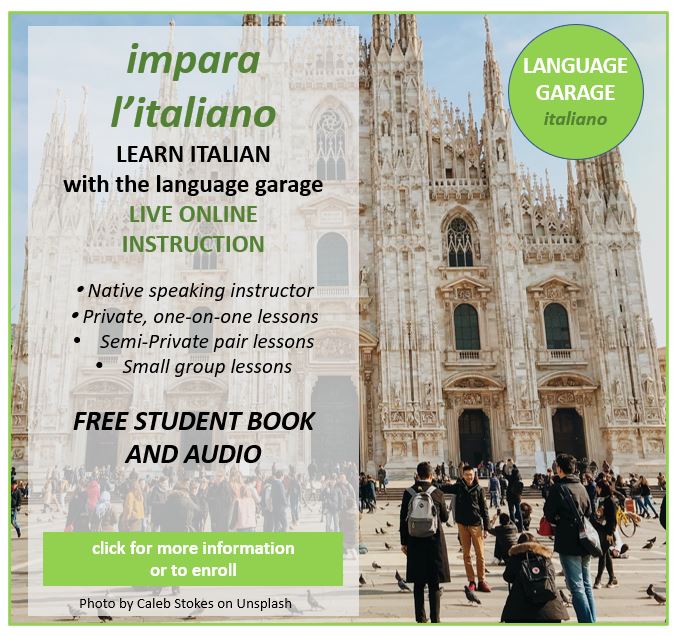Image credit: vrolanas on Pixabay
In this post we’ll take a look at Italian vocabulary, expressions, and grammar related to talking about what you like, what you find interesting, and what you’re really into doing.
Mi piace il cioccolato. I like chocolate.
If you’re talking about things or people that you like, use the verb piacere. Just remember that this actually means …is pleasing or …pleases. So the verb form will be piace if the thing you like is singular, and piacciono if it’s plural. And you’ll use a pronoun like mi (to me), ti (to you), gli (to him), le (to her), ci (to us), vi (to you plural), or gli (to them). You may also hear a me, a te, a lei, a lui, a noi, a voi, a loro instead of the indirect object pronouns. Also remember that you use the definite article with the thing you like.
- Mi piace il cioccolato/ la vaniglia.
I like chocolate/vanilla. - Mi piacciono i libri/ i film.
I like books/movies. - Ti piace il cibo tailandese?
Do you like Thai food?
- Gli piacciono i funghi/ le cipolle/ l’aglio.
He likes mushrooms/onion/garlic. - Le piace questa canzone.
She likes this song. - Mi piace questo cantante. Ti piace questo cantante?
I like this singer. Do you like this singer? - Mi piace tuo fratello/ tua sorella/ il tuo amico/ la tua amica.
I like your brother/sister/friend.
Notice that if the person who likes something is a noun, you use the preposition a (to) before it in these constructions.
- A mia sorella piace questo libro.
My sister likes this book. - Ai bambini piace il loro nuovo insegnante.
The kids like their new teacher. - A Paolo piace Firenze.
Paolo likes Florence.
Mi piacciono i cani più dei gatti. I like dogs more than cats.
If you want to say that you like A more than B, use the verb preferire to prefer, or mi piace X più di Y I like X more than Y.
- Io preferisco il cioccolato.
I prefer chocolate. - Mi piace il cioccolato più della vaniglia.
I like chocolate more than vanilla. - Mi piacciono i cani più dei gatti.
I like dogs more than cats. - Preferisco i cani.
I prefer dogs. - Ci piace più la pizza della pasta.
We like pizza more than pasta. - Preferiamo il cibo tailandese.
We prefer Thai food.
Mi piace cucinare. I like to cook.
If you’re talking about things that you like to do, use an infinitive after mi piace.
- Mi piace leggere / viaggiare / guardare la TV.
I like to read/travel/watch TV. - Mi piace imparare le lingue straniere.
I like to learn foreign languages. - Mi piace andare in bicicletta / nuotare / fare escursioni.
I like to ride my bike/swim/go hiking. - Le piace allenarsi al mattino.
She likes to work out in the morning. - Gli piace dormire fino a tardi la domenica.
He likes to sleep late on Sundays. - Ci piace guardare i film insieme.
We like to watch movies together. - A loro piace discutere di politica.
They like to argue about politics. - Cosa ti piace fare?
What do you like to do? - Dove ti piace andare in vacanza?
Where do you like to go on vacation? - Che tipo di film ti piace guardare?
What kind of movies do you like to watch? - Che tipo di cibo ti piace mangiare?
What kind of food do you like to eat?
Amo la fantascienza. I love science fiction.
If you really like or love something, use the verb amare (to love) or adorare (to adore), or the construction mi piace/piacciono davvero (I really like).
- Amo i cani/ i gatti/ gli animali.
Mi piacciono davvero i cani/ i gatti/ gli animali.
I love/really like dogs/cats/animals. - Amo il clima caldo/ la neve.
Mi piace davvero il clima caldo/ la neve.
I love/really like warm weather/snow. - Amo il cibo etiope.
Mi piace davvero il cibo etiope.
I love/really like Ethiopian food. - Ama la musica classica.
Gli piace davvero la musica classica.
He loves/really like classical music. - Adora i videogiochi.
Le piacciono davvero i videogiochi.
She loves/really like video games.
Vado pazza per questo nuovo ristorante. I’m mad about this new restaurant.
Some idiomatic expressions that you can use to talk about what you really like are andare pazzo/pazza per (to be made about), essere patito/patita per (to be really into), andare matto/matta per (to be crazy about).
- Vado pazzo/pazza per questo negozio/ristorante.
I’m mad about this store/restaurant. - Va pazza per la sua nuova macchina
She’s nuts about her new car. - È davvero patito per l’escursionismo, lo sci e la corsa
He’s really into hiking/skiing/running. - Sono davvero patito/patita per il campeggio.
I’m really into camping. - Va matto per le moto.
He’s crazy about motorcycles.
Amo mia madre. I love my mother.
To talk about loving a person in a non-romantic way, use the verb amare.
- Amo mia madre / mio padre.
I love my mother/father. - Amano i loro nipoti.
They love their grandchildren. - Ama sua sorella.
He loves his sister. - Ama i suoi amici / le sue amiche.
She loves her friends.
Ti amo. I love you.
Just as in English, you can use the verb amare (to love) for romantic love..
- Ti amo.
I love you. - Amo mia moglie.
I love my wife. - Amo mio marito.
I love my husband. - Si amano molto.
They love each other very much.
Le lingue sono interessanti. Languages are interesting.
There are all sorts of other ways to express that you like something.
- Questo libro è davvero bello / fantastico.
This book is really good/cool. - Le lingue sono interessanti.
Languages are interesting. - Trovo i libri/ le lingue/ i film interessanti.
I find books/languages/films interesting. - Penso che i libri siano più interessanti dei film.
I think that books are more interesting than films. - Lo sci è emozionante. Trovo lo sci emozionante.
Skiing is exciting. I find skiing exciting. - Viaggiare è affascinante. Penso che viaggiare sia affascinante.
Traveling is fascinating. I think traveling is fascinating. - La bicicletta è divertente. Mi piace molto andare in bicicletta.
Biking is fun. I really enjoy biking. - I film sono divertenti/ interessanti.
Films are entertaining/interesting. - Questa scrittrice è fantastica. I suoi libri sono incredibili.
This writer is amazing. Her books are incredible. - Questo ristorante è fantastico. Il cibo qui è squisito / delizioso.
This restaurant is great. The food here is exquisite/delicious.
Do you want to learn Italian?
Check out our other posts on Italian language, culture, and more. And if you’re looking for convenient and affordable live Italian lessons with a real teacher, check out The Language Garage. Our lessons are given online in a virtual classroom, so it doesn’t matter where you live or work – we can come to you. And we have flexible options, with a free trial so that you can decide if there’s a fit. Check us out!






